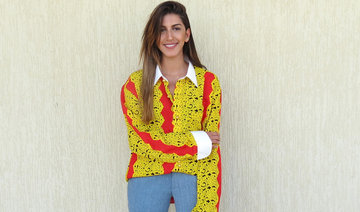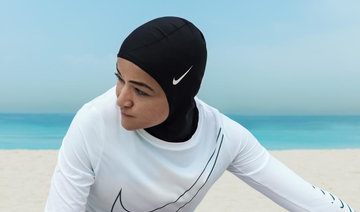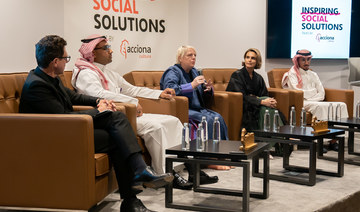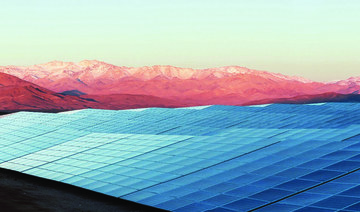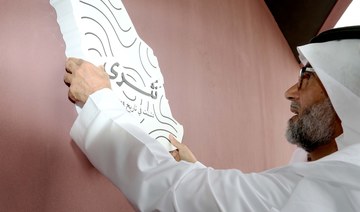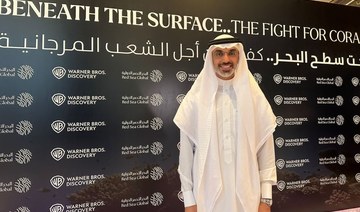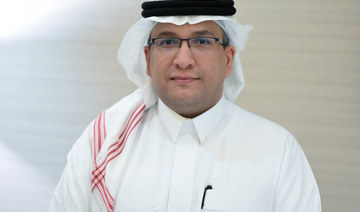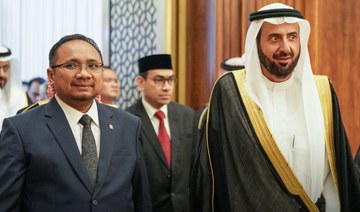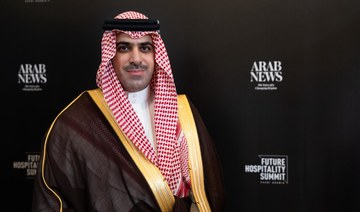JEDDAH: She is a rarity in the foreign diplomatic corps in Jeddah. Ever since she arrived in January 2015 for her first foreign posting as Italy’s consul general, Elisabetta Martini has carved a niche for herself and her country through her extraordinary work and outreach efforts. On the eve of International Women’s Day, she spoke to Arab News about the challenges she has faced as a female diplomat, and her observations about Saudi women.
She chose Saudi Arabia as her diplomatic posting “because it was an extremely challenging post, and that was the hook for me. When somebody throws a challenge at me I immediately accept it. When I was asked to apply for foreign posts, I chose Jeddah.”
Martini describes Saudi Arabia as “a very powerful country in terms of natural resources, in terms of being a regional power, a country that maintains the regional balance in the Middle East. Before coming here, I knew of Saudi Arabia as a giant that wasn’t fully awake. It has the potential to become the most powerful country in the region.”
She started her diplomat career in 2012. She was posted in Rome for two years, where she dealt mostly with European affairs and foreign policy. She graduated in political science and completed her master’s in international relations.
She interned for six months at the Italian Embassy in Washington, DC, while she was doing research for her final thesis at John Hopkins University. The subject of her thesis was the Silk Road. During her time in the US, she was associated with a well-known Italian think tank, the International Affairs Institute (IAI). “That’s when I realized the importance of think tanks,” she said.
From the US, Martini moved to Brussels as the assistant of the representative of the Italian Senate at the European Parliament. “That was an extremely useful experience for me,” she said.
Later, she worked as an export manager for a German design company. “I represented this German firm and I used to sell a lot of their products to mostly Arab clients,” she said. All this experience stood her in good stead. “I got to know the private sector, the powerful role of think tanks and then the public sector,” she said.
In the first week of her arrival in Jeddah, King Abdullah died. “So change started to happen very quickly. That was another challenge for me, because my first public appearance was to give condolences for the death of the late king in the (presence) of the governor of Makkah,” Martini said.
“They were all men. There was a discussion between me and my colleagues, and with other consul generals, about how I should be dressed, how I should look… and how I should behave when paying condolences (here). At the same time, it was my first public appearance.” She said she covered her head out of respect for local traditions. “That really went well.”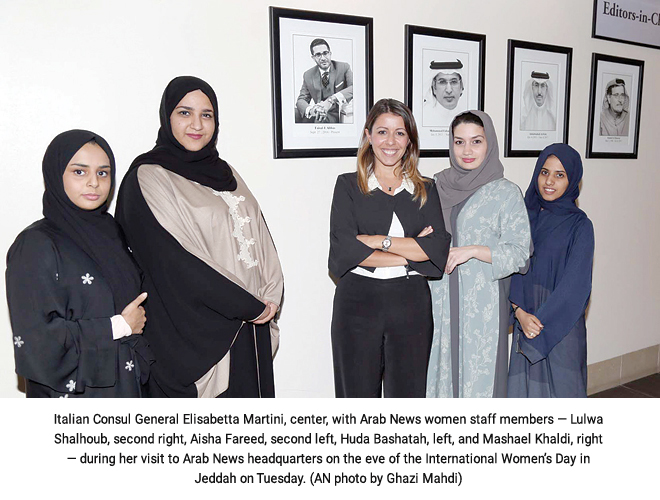
On how challenging it is for a female diplomat in a country where women are not the predominant force in public life, she said: “It’s difficult for women, not just a female diplomat, all over the world, not just in Saudi Arabia. In my country, when I deal with my own people as myself and not as a diplomat, I support women’s rights. Everyone should give this contribution to the development of his or her own country.
“However, one shouldn’t interfere in the policies of other countries. In Italy, there’s a top-down policy that tries to push women into key areas. Women around the world have to work from the bottom up, instead of top-down.” She said people in Italy are surprised to know that she is the consul general in Jeddah.
Regarding Saudi women, Martini said she has seen a lot of changes. “When I came here, I was a bit surprised because the American consul general was a lady before me. The British consul general was a lady some years ago. The German consul general was a lady, so I wasn’t the first lady in the diplomat service here. The difference was that I was young, so I had to prove myself.
“Women are more critical toward other women because we know how much we have to fight and struggle for something. But when you see someone has made it to the top, you ask how she achieved it. Maybe because she’s the daughter of an ambassador? They try to belittle your success.”
Martini said she has interacted with a lot of women here. “Saudi Arabia isn’t one Saudi Arabia. There are different layers of society. There’s a big difference between the various classes of society. Some women who come from opened-minded families don’t have to face any problem. There are women who participate in municipal elections and civic activities.
“But there are some women who face lot of issues. So there are different layers. There are some women in Saudi Arabia who are more qualified than me and can do whatever job they want. Their fathers, husbands and brothers admire them. It’s amazing. But others have to struggle a lot.”
As a diplomat, did she encounter conservatives in the Kingdom, and if so how did she deal with it? “In Saudi Arabia, people recognize authority. They have a very strong sense of authority. They might say ‘you’re a lady and young,’ but they know I represent Italy in Jeddah. They have a strong respect for the state. So as far as I’m the consul general, they respect me. Everyone meets with me in a very respectful way.
“So far, I’ve never met someone who refused to shake my hand. I found Saudis super welcoming. I’m always being welcomed to their houses for big and intimate gatherings. They try to make me feel at ease.”
About women journalists in Saudi Arabia, Martini said: “It’s very important to encourage female journalists because it’s very important to have their point of view. They’ll always have a different point of view. Only they can understand their issues well.”
She said in advanced countries, women do not want to celebrate International Women’s Day as they have already reached gender equality. “But for me this occasion reminds us of the importance of women in society. We need to push the role of professional women in the world. We’re the other 50 percent of society. My message to women is not to rely on the fact that they’re women. They must think of themselves first and foremost as human beings, and go ahead in life.”
Italy’s first woman consul general sees a multi-layered, dynamic Saudi society
Italy’s first woman consul general sees a multi-layered, dynamic Saudi society
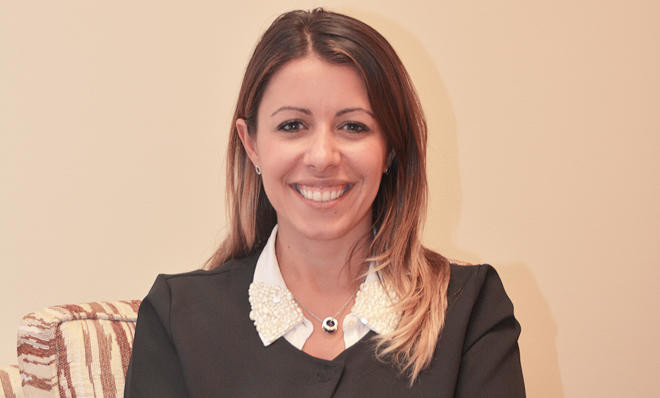
ACCIONA presents its first talks in Riyadh on reverse osmosis desalination
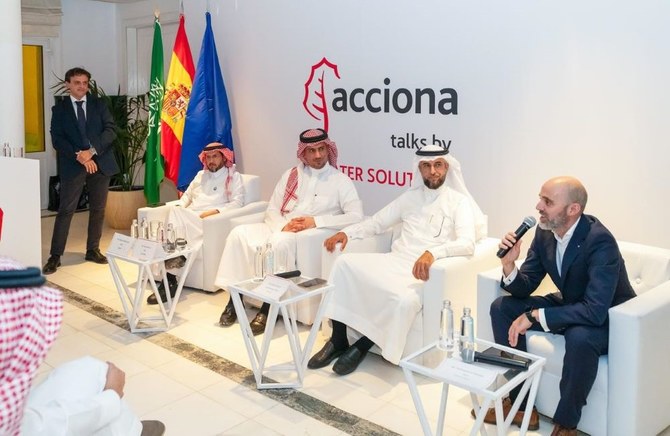
- First in a series of events at the Spanish Embassy highlights solution to water scarcity in the Kingdom
- Speakers emphasized how Saudi Vision 2030 highlights the importance of investing in desalination technology such as reverse osmosis
RIYADH: ACCIONA, a leader in regenerative solutions for a decarbonized economy, held its first panel discussion in its series of talks designed to promote regenerative and sustainable solutions in Saudi Arabia.
The event, held at the Spanish Embassy in Riyadh on April 28, brought together leading figures from across the sector, government, and businesses to showcase the importance of reverse osmosis technology in the water cycle.
The Riyadh event follows an inaugural panel discussion of a series, entitled “The Saudi Solution for Water Sustainability: Reverse Osmosis Desalination,” which explored achieving water sustainability in the Kingdom.
Panelists who participated included Khaled Al-Qourashi, CEO of the Saudi Water Partnerships Co., Khalid Al-Habib, chief investment officer of Water Transmission and technologies Co., ENGIE Saudi Arabia CEO Mohammed Alhajjaj, and Manuel Manjon, CEO of ACCIONA’s water business line.
The participants shared their experience in the sector and explained the importance of managing water resources efficiently to meet the needs of the growing population and expanding economy without compromising future generations’ ability to access clean water.
Given its arid climate and limited freshwater resources, Saudi Arabia relies heavily on desalination plants to meet its water needs.
The speakers emphasized how Saudi Vision 2030 highlights the importance of investing in desalination technology such as reverse osmosis, and of expanding the capacity of existing desalination plants to ensure a reliable supply of freshwater for domestic, industrial, and agricultural use.
Saudi Arabia is one of the world’s largest producers of desalinated water, with numerous desalination plants along its coastline. Reverse osmosis technology plays a vital role in addressing water scarcity challenges in the Kingdom by providing a sustainable and reliable source of clean water for different sectors and applications, contributing to the country’s economic development, environmental sustainability, and social well-being.
Mideast, global water sustainability under spotlight at Riyadh forum
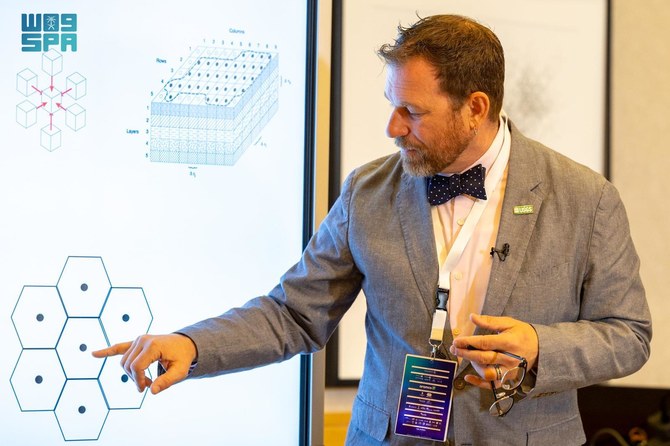
- 10 workshops held to discuss the region’s water challenges
- Kingdom’s major projects outlined by Saudi Arabia minister
Riyadh: The third Saudi Water Forum, being held in Riyadh until May 1, has featured 10 workshops focusing on the future of the water sector, in line with Saudi Vision 2030.
The forum was inaugurated on Monday by Saudi Arabia’s Minister of Environment, Water and Agriculture Abdulrahman Al-Fadhli under the theme “Water Sustainability ... Our Responsibility.”
The forum began with a workshop titled “Getting Started with MODFLOW for Groundwater Modeling” presented by a US Geological Survey speaker, alongside Saudi Aramco sessions titled “Water Conservation” and “Water Safety Plan.”
The National Water Co. presented its future projects and investment opportunities, showcasing its capital projects portfolio, long-term operation and maintenance contracts, and efforts to localize industries in the water sector.
The Saudi Irrigation Organization held a workshop titled “Innovative Techniques to Enhance Irrigation Efficiency and Agricultural Sustainability,” while the Saline Water Conversion Corp. hosted discussions on innovation and challenges in relation to emerging technologies.
The Saudi Water Partnership Co. outlined its services and future projects, while several UN organizations hosted a discussion titled “The Role of International Organizations in Developing the Water Sector.”
Additional workshops included “Water Treatment and Digital Solutions” by K-Water Corp. and “Non-Revenue Water Management” by the Turkish Society for Infrastructure and Trenchless Technologies.
Al-Fadhli opened the forum by stating that Saudi Arabia has launched several regional and global initiatives to address water challenges and explore sustainable solutions, aligning with Vision 2030.
He emphasized the government’s support and commitment to overcoming obstacles in the water sector, to enable the implementation of various strategic projects throughout the Kingdom.
Al-Fadhli highlighted the significance of Saudi Arabia’s water sector initiatives, noting their role in advancing national goals. He said the Kingdom is the world’s largest producer of desalinated water, underscoring the pivotal role of these initiatives.
Saudi Arabia’s projects include the establishment of the Global Water Organization, headquartered in Riyadh. This initiative showcases the Kingdom’s role in supporting global efforts to address water challenges and achieve the UN Sustainable Development Goals.
Saudi Arabia features in new series of anime show ‘Grendizer U’
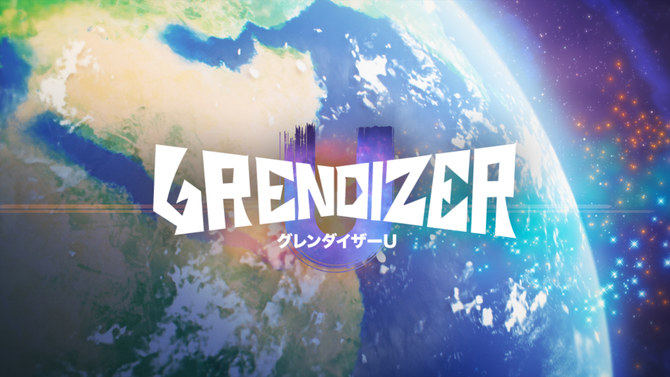
- The anime project developed by Manga Productions will launch in July
RIYADH: A second promotional video for “Grendizer U”, which returns 40 years after the original anime series, reveals various regions of Saudi Arabia appear in the show.
New designs for characters have also been unveiled and the broadcast date is planned for July.
The video was launched on Riyadh-based Manga Productions’ YouTube channel in Arabic, English, French and Italian. It can also be viewed on the official “Grendizer U” social media accounts via @GrendizerAnime.
Manga Productions’ CEO, Dr. Essam Bukhary, said: “We at Manga Productions, in collaboration with our partners in Japan, are pleased to introduce the character of Grendizer to future generations in a new and exciting way through the distribution and marketing of this work to global audiences. We hope for ‘Grendizer U’ in its new version to inspire the heroes of tomorrow worldwide.”
A strategic partnership between Dynamic Planning, which owns the rights to Grendizer, and Manga Productions was announced in 2022. This led to the unveiling of the character’s statue in Riyadh. Standing more than 33 meters high, it was recorded by Guinness World Records as the largest metal statue of a fictional character in the world.
The first teaser for the new series was launched at the Akiba Daisuki Festival in Tokyo in August 2023, with the initial promotional video following in December.
Last year, Manga Productions also released the game “UFO Robot Grendizer: The Feast of the Wolves” in the Middle East and North Africa, in cooperation with French company Microids.
The official English trailer on Manga Productions’ YouTube channel says the new series is based on Go Nagai’s “UFO Robo Grendizer.”
The second video features the staff of “Grendizer U,” including General Director Mitsuo Fukuda.
King Salman academy launches AI Arabic language processing center
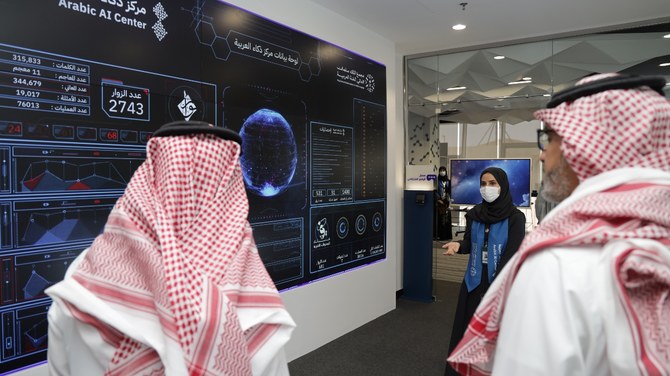
RIYADH: The first center for automated Arabic language processing, called the Arabic Intelligence Center, has opened in Riyadh, operated by the King Salman Global Academy for Arabic Language.
The center aims to enhance Arabic content in the fields of data and artificial intelligence and support scientific research and applications to help achieve the goals of the National Strategy for Data and Artificial Intelligence and Saudi Vision 2030, which seek to position Saudi Arabia as a global leader in this field.
Abdullah Al-Washmi, secretary-general of the academy, said the center’s success relies on its strategic goal of advancing Arabic language innovation, integrating AI technology for local and international use.
He told Arab News that the center brings together Arabic language specialists and technology experts. “Their shared interest in the Arabic language unites them,” he said.
To achieve its strategic goals, the center will enable AI-based innovations, support the development of applications, and certify qualified individuals with international standards to advance automated Arabic language processing knowledge, Al-Washmi said.
The center comprises five main laboratories: the Artificial Intelligence Laboratory, which focuses on developing technical research for the Arabic language and its processing; the Data Formatting Laboratory, which collects, tags, processes, and ensures the quality of Arabic data, whether written, audio, or visual; the Audio and Visual Laboratory, which records, processes, stores, and classifies audio and visual data; the Virtual Reality and Augmented Reality Laboratory, which creates Arabic software using virtual and augmented reality; and the Researchers’ Laboratory, which provides office space for researchers working in these fields to conduct their studies on Arabic computing.
Al-Washmi said: “The center ensures its strategic role through initiatives that support the Arabic language, aligning with the objectives of the Human Capacity Development Program, one of the programs under Saudi Vision 2030.”
He added that these initiatives focus on supporting computer applications that aim to stimulate automated Arabic language processing in both understanding and production, placing it in a uniquely competitive position among other languages.
The center’s services also include providing technical and linguistic consultations in the field of processing the Arabic language with AI, organizing meetings and training sessions, offering paid licenses to researchers, supporting studies with similar objectives, and contributing to data tagging for collaborative research.
New incubator will promote sustainable mining in Saudi Arabia
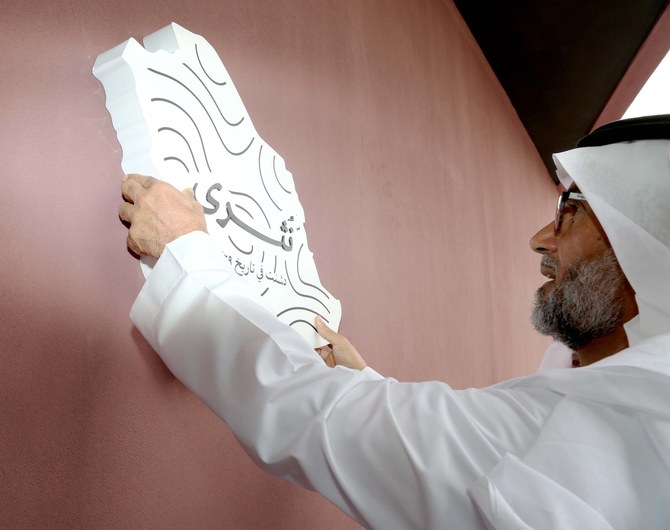
- ‘Nuthree’ aims to boost mining entrepreneurship in the Kingdom
MAKKAH: Nuthree, an exploration incubator initiative for entrepreneurship in geology and mining, has been launched at the Saudi Geological Survey’s headquarters in Jeddah.
The project seeks to create a sustainable exploration environment to develop the Kingdom’s resource sites, positioning mining as its third pillar of income after petroleum and petrochemicals.
Saudi Geological Survey CEO Abdullah Al-Shamrani said the Kingdom was experiencing a new phase of growth and prosperity under King Salman and Crown Prince Mohammed bin Salman, driven by the Saudi Vision 2030 and the National Industrial Development and Logistics Program.
He told Arab News: “We aim for cooperation and integration with our partners in the Ministry of Industry and Mineral Resources and the Small and Medium Enterprises General Authority to serve and empower emerging investors in the mining exploration sector from individuals to local companies, and to establish a local, sustainable exploration environment through the Kingdom’s resources sites, making it an entry point for promising industries.”
He added Nuthree enhanced geological knowledge due to the variety of metals in the Kingdom and would serve as an incubator for small-scale investors and explorers.
“We support the localization of exploration for Saudi companies and foreign firms operating in Saudi Arabia because of its strategic importance,” Al-Shamrani said.
The Saudi Geological Survey is gathering information quickly to attract investors. This includes a comprehensive survey of the Kingdom’s sedimentary cover and the Arabian Shield.
Al-Shamrani said the incubator’s primary goal was to support and localize exploration in the Kingdom, helping investors engage in the process in a professional and practical way. It supplies information across various geological fields and the range of metals it is planned to explore is extensive.
“We expect investors to form complementary partnerships and alliances to achieve the best outcomes. This is a significant step that we support,” he said. “We will not only offer information but also support drilling, coordination and advisory visits to key locations.”
Abdulrahman Al-Balushi, undersecretary of the Ministry of Industry and Mineral Resources, told Arab News that exploration was the start of the mining process which was why it was so important.
He said the Kingdom was focused on supporting small and medium-sized enterprises through partnerships with the private and public sectors, as well as academic institutions, to help them obtain licenses and uncover new mining opportunities.
Al-Balushi said: “The ministry granted 500 licenses to private sector companies, allowing them to explore ores in base metals and precious metals.” Some of these companies were Saudi-based, he added, while others were either joint ventures or foreign-owned but registered with the Saudi Ministry of Commerce.
The exploration process receives particular support if “it targets locations with ores that are very important for the Kingdom’s industry, such as nickel, lithium, zinc, and copper, or certain materials that are part of simple and transformative industries and have a significant impact on the Kingdom’s economy,” he said.
Al-Balushi said the Nuthree incubator aimed to support small and medium-sized enterprises in the Kingdom by providing expertise in geology and mining. It offers technical courses, organizes trips to mining sites, and facilitates knowledge sharing with geological experts.





